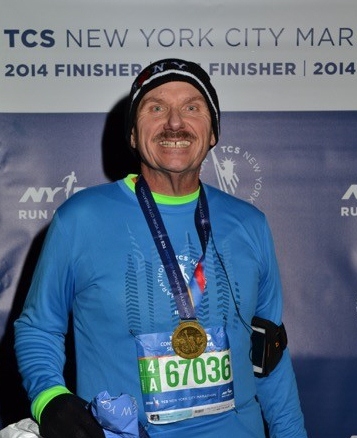Preparing for a Triathlon after Outrunning Espophageal Cancer
My name is Mark Carpenter, and I owe my life to the doctors and nurses at UCSF.
My story began in January 2010, when it became difficult to swallow. A few weeks later my general practitioner delivered the news that changed my life forever: I had esophageal cancer.
I went first to a surgeon in my local community who was unwilling to operate given the advanced stage of the tumor. Along with my wife, I decided to search for a second opinion. We were referred to UCSF where we met with Dr. David Jablons, chief of Thoracic Surgery and program leader of the Thoracic Oncology Program, who believed I was a good candidate for surgery.
I have since learned that many other patients, unsatisfied with the standard treatments offered them, have turned to the Thoracic Oncology Program at UCSF because of the willingness to take on high-risk cases, personalized approach to care, and top notch research program which has made great progress in developing new treatments and cures.
My journey through surgery and chemotherapy was long and arduous, just as I had been advised. All told, I spent the entire year of 2010 as a patient. It was a challenging year but it was worth it – I am alive and remain cancer free to this day. I am committed to maintaining my good health; I have adopted a healthy diet and am training to compete in the 2014 Ironman triathlon series.

I cannot say enough about the talented professionals who cared for me at UCSF. The brilliant doctors were so kind, compassionate, and generous with their time, and the nurses were like angels visiting my bedside. As members of UCSF’s renowned Thoracic Oncology Program, they have extensive experience working together to provide state-of-the-art treatment for patients with esophageal cancer, lung cancer, mesothelioma, sarcoma, and cancer that has metastasized to the chest.
It was clear to me at all times that the therapies I received were informed by the robust research conducted by physician-scientists in the Thoracic Oncology Program. In fact, after my surgery, Dr. Jablons asked if he and his team could study my tumor in order to learn more about advanced esophageal cancers and develop improved treatments for future patients.
I was more than happy to oblige, and this became the first act in support of my new purpose: to give back to the people and the health care industry that saved my life.
The Thoracic Oncology Laboratory at UCSF boasts a tissue bank with tumor and normal tissue from more than 1,000 patients, and researchers are rigorously analyzing the DNA from these samples, like the one from my own cancer. By identifying the genetic patterns of disease that are emerging from this huge collection of information, the lab is learning how thoracic cancers develop and proliferate, and where these diseases might be vulnerable to treatment options. They are also developing drugs to target these vulnerabilities, and tailor these new therapeutics to groups of patients whose tumor DNA is most likely to respond to these drugs.
UCSF gave me hope, and thus the drive and determination to make it through treatment and arrive where I am today. I will be forever grateful. If you would like to learn more about Dr. Jablons’ research please visit the Thoracic Oncology Program and the Thoracic Oncology Laboratory.
- Mark Carpenter
